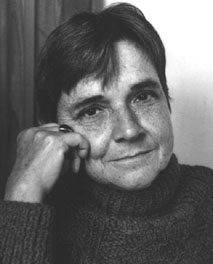Adrienne Rich's "Notes toward a Politics of Location"
 When I first read the title for this piece, I'm not gonna lie, I was a little put off. It probably has to do with my general aversion to anything to do with "politics." I think I've grown up around so much controversy surrounding that word that I limit what I learn because of it's presence. ANYWAYS, what I'm getting at here is that I was surprised to find that this was one of the more enjoyable and life applicable pieces I believe we have read all semester. I guess I really shouldn't judge a book by it's cover!
When I first read the title for this piece, I'm not gonna lie, I was a little put off. It probably has to do with my general aversion to anything to do with "politics." I think I've grown up around so much controversy surrounding that word that I limit what I learn because of it's presence. ANYWAYS, what I'm getting at here is that I was surprised to find that this was one of the more enjoyable and life applicable pieces I believe we have read all semester. I guess I really shouldn't judge a book by it's cover!
The general concept of Rich's piece focused on the recognition of women's experiences. Its almost as if she is calling upon all the women in the feminist movement to realize that just as men and women aren't the same, or those of different races aren't the same, not all women are the same. Location is essential in realizing the individual experience and needs of every individual women. Yes, there are universal rights that every woman should acquire, however, the ways in which they are acquired, differ. The feminist movement does not allow for those other than white to actively or effectively participate. As Rich points out, for a country that prides itself on freedom, it definitely cuts off a large portion of its people from participating in its movements.
So, it is the discourse that creates this divide. As Rich so wonderfully puts, "The discourse has never really changed; it is wearingly abstract. it allows no differences among places times, cultures, conditions and movements. Words that should possess a depth and breadth of allusions-- words like socialism, communism, democracy, collectivism-- are stripped of their historical roots, the many faces of the struggles for social justice and independence reduced to an ambition to dominate the world" (pg 1101).
As I read this I couldn't help but relate it to all the pieces by bell hooks, Audre Lorde and Patricia Hill Collins who continuously press for the individual experience of women of color to not be ignored or marginalized, but to be recognized and respected. It was kind of cool to see a western educated, white woman come to this type of epiphany.
" It was in the writings but also the actions and speeches and sermons of black united States citizens that I began to experience the meaning of my whiteness as a point of location for which I needed to take responsibility..." (pg 1100)
 |
| "Notes toward a Politics of Location" was originally published in Blood, Bread and Poetry (1986) |
No comments:
Post a Comment
Note: Only a member of this blog may post a comment.